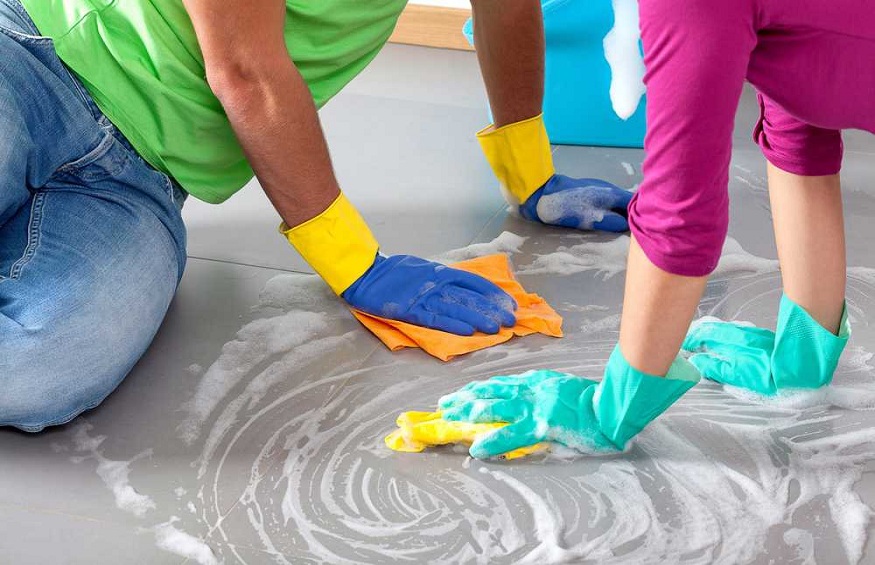the natural stone will also give you relentless service over many years, regardless of whether you have installed it at the residential or commercial building.
But as you know, you need to take care of a valuable possession, and the natural stone is also no exception. Using harsh cleaning solutions to remove the stains and grit, will damage the stone surface. Needless to say, the repair or replacement will be an expensive affair.
Know your stone
There can be two general categories of the stone based on the composition- calcareous stone and siliceous stone.
- Siliceous stone chiefly comprises quartz-like particles and silica. It is durable, and cleaning with solutions of mild acidic components is possible. Granite, Quartzite. Sandstone, Slate, Bluestone, and Brownstone are the main types of siliceous stones.
- Calcium carbonate is the chief constituent of calcareous stones. The stone is sensitive to any acidic cleaning products but needs frequent cleaning, unlike the siliceous stones. Marble, limestone, travertine, and onyx are the common instances of calcareous stones.
What may work on the siliceous surface won’t be ideal for the calcareous surface.
Studying the reactions carefully
Unless you maintain a careful record of the type of stone and its origin, it will not be easy to clean the surface. Although professional cleaners will make it a point to identify the stone and then start the cleaning job, you won’t be able to buy the cleaning solutions without the knowledge.
1. Consultation with professionals
You don’t know whether the flooring stone or the countertop has a siliceous or calcareous stone, you can directly ask the stone supplier or floor installer. They can give you the correct information.
2. Visual identification tips
Of course, there are exceptions to the standard trends of visual identification, and the following characteristics are common.
- Little veining and crystal pattern of the granite is common, which can bear small flecks.
- A limestone is a common form of building stone in the colour range of tan, buff, or grey. The presence of fossil or shell impressions is common in the limestones.
- Veined and fine-textured marble provides you with virtually unlimited colour variation options.
- Slates are grey, dark red, dark green, black, or multi-coloured. Slates are one of the most common flooring materials for roof tiles, and the cleft texture is a distinguishing feature.
3. Sensitivity test
The best way to determine whether the mild acidic cleaning products will have an impact on the stone is to conduct a simple test at your home. All you need is 4 ounces of a 10% household vinegar solution (muriatic acid) an eyedropper. Then, apply a few drops of the acidic solution at an out-of-the-way patch.
- If the acid drops fizz vigorously or form bubbles, it will imply that the stone is calcareous.
- If there is no reaction or very little reaction, the stone will be siliceous.
Choosing the right manufacturer
As you know, buying any floor cleaner is not the right way to treat natural stone flooring. You have to be extremely selective about choosing the right cleaning agents. Therefore, it is vital to know about the Natural stone cleaning products – The use and its basic features to work on and then decide whether such cleaning products will be suitable for the flooring.
1. Acidic or alkaline
The first point to check about the cleaning solution is whether the nature of the solution is acidic or alkaline. The alkaline pre-treatment cleaners are good for stone, porcelain, man-made ceramic, and quarry tiles.
2. Technological implementation
With the continuous advancement in technology, there has been a remarkable improvement in the features of the cleaning agents too. The premium products will always use the latest amazing features of surfactant technology that can melt away the stains, grease, and soil. These won’t need the addition of highly caustic builders or additional solvents.
3. Appropriate for deep cleaning
For commercial buildings like restaurants and their kitchens, the foot traffic and spills will be maximum. In such areas, you need high-tech grout cleaners that can easily remove the oil and grit. The removal of solvents from the ideal cleaning agents has been a big leap towards the improvement of features.
4. Special features for oil removal
It is not easy to remove the oil spills from the natural stone surface, be it the flooring or the countertops. So you should use a synergistic product that can clean and degrease the dirtiest and grungiest areas of the tiles, floors, and fixtures. In addition, it should contain the right balance of surfactants and oxygen-activated alkaline builders.
5. Use top-grade sealer
You have always learned that prevention is better than cure. So it will be a good idea to minimize the use of cleaning products and use professional-grade sealers to protect the floor from dry soils, water-based spills, and oil. The sealers from top-notch manufacturers are effective on semi-absorbent or absorbent stones.
6. Compare the prices
When it comes to buying natural stone cleaning products, you have first to check the most popular products available in the market. Then a comparative analysis is mandatory. Price is one of the key parameters for comparative study, although it is not right to always settle for the cheapest product. It may cost you less money, but prolonged use can damage the flooring and trigger further investment.
A final word
The above information will be helpful when you are trying to maintain clean flooring without affecting or damaging the natural stone. If you succeed, you can minimize the wear and tear. And it will play a significant role in prolonging the service life of the natural stone flooring and countertops.











